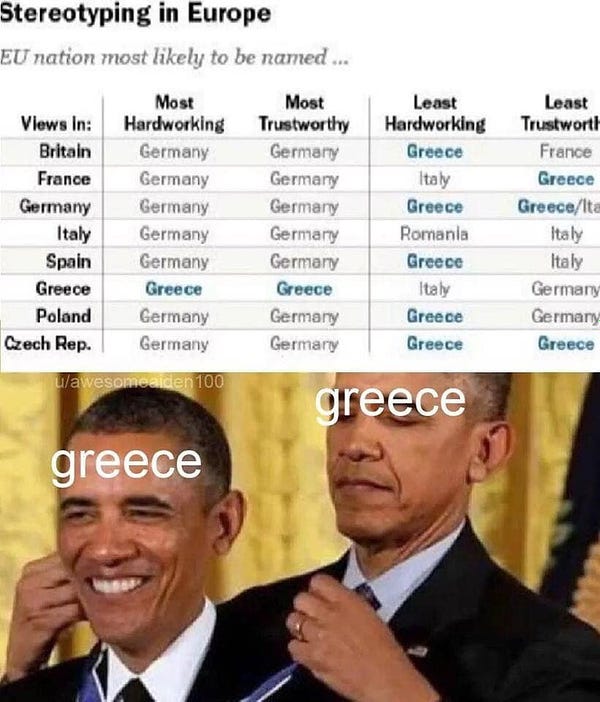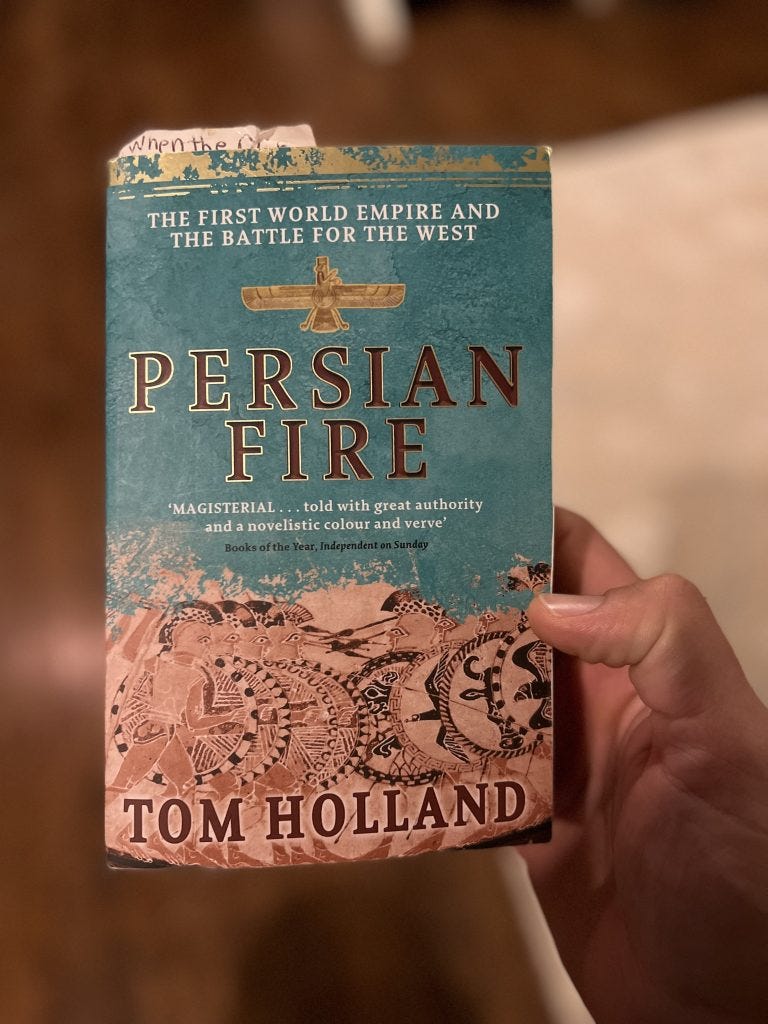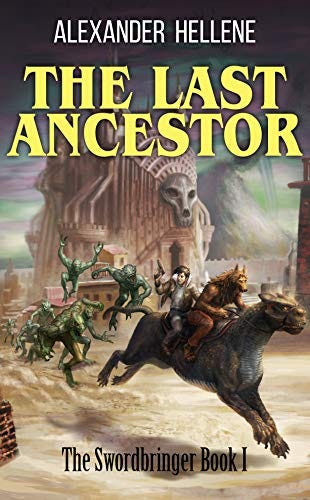Every team needs an “irrational self-confidence” guy. This is the member who believes in the success of the mission and the ability of everyone involved to the point of ridiculousness, but the enthusiasm is infection and pushes everybody to do their best. Very often, the less-talented the irrational self-confidence guy is, the better—he serves to remind the top-tier of the team that they can do it because, hey, if the last guy on the bench has swagger, why shouldn’t the superstars? At bottom, if I may use another hackneyed sports metaphor, the irrational self-confidence guy reminds everybody that the game isn’t over until the final whistle blows, and that your team has as much of a chance at winning than the other guy.
Given this, based on this map of dubious authenticity, Greece is the irrational self-confidence guy of Europe:
As you can see from the responses to this tweet, as well as the 2.3 million views, it struck a chord somewhere. As the kids say, it did numbers. A big part of it is the fact that the stereotype of Greek irrational-self-confidence is well-known and hilarious, especially given Greece’s relatively low status on the totem pole of European nations. However, the point I was trying to underscore is that every country should be at 100 percent.
Loving who you are doesn’t mean hating everybody else. Being pro-Greek doesn’t mean you’re anti-Danish or whatever. It just means you don’t hate yourself. And that’s good!
Here’s another, even funnier, example of Greek irrational self-confidence from a respondent:
And why not? Why shouldn’t a nation view itself as the best? To not do so is criminal.
The fact is, little Greece is one of the few European nations to physical defend its borders from the hordes of migrants being unleashed into Europe by Turkey in a bid to strongarm the EU for various concessions. Despite all of its problems, Greece has enough sense of national unity to care about what happens to it and its people, and recognize that they are a distinct people, just like everyone else. Merely being born in Greece does not make one a Greek (sorry, Giannis) . . . any more than merely being born in America makes me an American in any respect but on paper.
I want Europeans to look down their noses at everyone else the same way I want Americans to swagger like they have the biggest you-know-what’s in the room. The same way I want the Chinese to care about China, the Nigerians to care about Nigeria, and so on and so forth. It doesn’t mean we can’t all cooperate and get along. It just means that the people in charge actually want what’s best for their people. A nation is it’s people, as opposed to the state, which is largely a fiction.
So yes, I’m in agreement with Thales of Miletus. Who am I to argue with the father of philosophy?
All kidding aside, this stuff matters. I am reading the excellent Persian Fire by Tom Holland, a wonderfully written book about the Greco-Persian wars of the 4th century BC. It begins with a history of the Persian empire, and then of Sparta and Athens. I recently finished the part where the Athenians defeated the Persians at Marathon, and it’s hard not to feel my breast swell with pride. These were my ancestors, even though I’m not Athenian (the closes I have is family on my mother’s side from Euboia, the large island across the narrow strait north of the Attican peninsula). To deliver the first Greek victory in open combat over the Persians was amazing and being proud of it is not a knock on people of Persian ancestry living today. Quite the contrary: I have a lot of respect and admiration for the Persians. But Athenian irrational self-confidence helped them, as Holland puts it, singe the King of Persia’s beard.
Heady stuff.
This is so important, it’s a theme in my owl novels. In The Last Ancestor, both the human settlers and the Kharvali believe in themselves to the point of seeming insanity, doing what needs to be done against all odds to protect themselves. This is in contrast to the far more advanced and culturally civilized Pyshans, whose own self-confidence has fallen to the point that, when we meet them in The Second Sojourn, they’ve been under rule by foreigner—from their former colonies, no less—for over a generation. I explore this dichotomy not only because it makes for interesting drama, but because the historical parallels are too interesting not to delve into.
It’s hard to have a civilization without any people, you know? This is no great revelation yet is a verboten subject in what was formerly called Christendom. Religion, or lack thereof, among peoples of European descent is another problem beyond the scope of this post. Let’s leave off with the idea that energetic, self-confident peoples will overtake a sclerotic, self-loathing people, and that religion forms a core of a people’s identity. I wish that all peoples everywhere have the delusional and yet completely justified irrational self-confidence of the Greeks. I want all nations to survive and be excellent to themselves and each other, to be good neighbors, and to keep humanity from blowing itself up and turning our lovely planet, indeed, all of God’s creation, into an ugly slag-heap for at least a few thousand years more.
– Alexander
I am irrationally self-confidence that you’ll love my books. Buy The Last Ancestor today!












Alexander,
Yeah I saw the map at Twitter. Since I'm still banned, I'll comment here.
In the case of Spain and France I want to see the regional breakdown. The 20% for Spain is overall?, Castille, etc? You get the idea. Spain and France under siege by a hostile elite ; in the case of Spain, well it's been a problem for 500 years. Ferran the Catholic belonged to the Castilian branch of the Trasmuntana family and only had a claim to Aragon through some distant ancestor through the mom side.
In any case, I'll just summarize that ever since the Catalan officials picked Ferran over Jaume III of Urgell, it was clear that there would be unending conflict.
Catalunya-Arago was already evolving towards a proto parliamentary system with division of powers.
Castille was a crusader kingdom that still hadn't totally reconquered its lands at the time Ferran became king of Catalunya-Arago.
So the former was an aristocratic warrior society (Prussia had a similar problem) and has remained so to this day. It's never been able to change course as times changed. And that's been the problem.
xavier
The map muß be wrong. Germany wants to disappear from the earth due to eternal guilt. So 0% seems way more realistic than 45%.